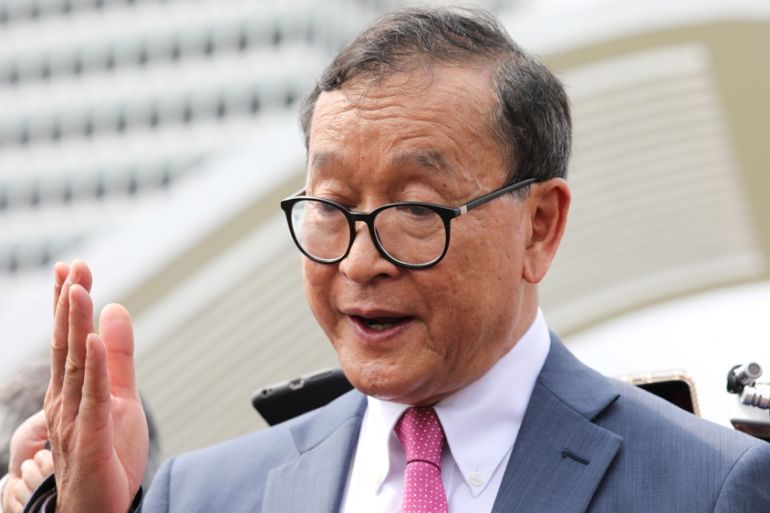Exiled Cambodian opposition leader calls for ‘peaceful uprising’
Sam Rainsy, who was prevented from entering Cambodia, urges country’s powerful military to side with people.

Kuala Lumpur, Malaysia – Cambodia‘s self-exiled opposition leader Sam Rainsy has called for a “peaceful uprising” in his country and has urged the powerful military to side with the people by “not shooting at them”.
“I have called for a peaceful, popular uprising. The Cambodian authorities … have deployed the army, with tanks, machine guns, to kill us. But I have called on the Cambodian army to not shoot at the people,” said Rainsy during his visit to Malaysia.
Keep reading
list of 3 items‘No alternative’: Rainsy determined to return to Cambodia
Malaysia detains two Cambodian dissidents headed for Thailand
“[Prime Minister] Hun Sen is very afraid. He is not sure of the loyalty of the army. The army will stand with the people. The army will not stand with dictators,” Rainsy told reporters outside the Malaysian parliament after a meeting with legislators including Nurul Izzah, daughter of former Deputy Prime Minister Anwar Ibrahim.
Rainsy also promised that China would not be allowed to build any military facilities in the country if the opposition came to power, accusing Prime Minister Hun Sen’s government of “playing with fire” by “siding with China”.
“Cambodia must be neutral. Cambodia must not allow China to build facilities that can be turned into military facilities very quickly … This has raised a lot of concern in neighbouring countries,” Rainsy told reporters in Kuala Lumpur.
“I can assure all friends of Cambodia that when democracy prevails in Cambodia, we will not allow China to build any military facilities on the Cambodian soil,” said Rainsy.
Chinese influence
Last July, the Wall Street Journal newspaper reported that China had signed a secret agreement, which was never made public, allowing its armed forces to use a Cambodian naval base near the coastal city of Sihanoukville.
The WSJ also reported that an early draft, seen by US officials, would allow China to use the base for 30 years, with automatic renewals every 10 years after that. China would be able to post military personnel, store weapons and berth warships.
Cambodia’s Ministry of National Defence spokesman Chhum Socheat told Reuters News Agency that the report was “made up and baseless” while the Chinese foreign ministry declined to respond to repeated questions.
In November last year, Hun Sen admitted to receiving a letter from US Vice President Mike Pence raising concerns over the possible presence of a Chinese naval base in Cambodia in the future.
Hun Sen said Cambodia’s constitution prohibited the presence of foreign armies or military bases inside the country and that the country would not violate its own constitution.
Shahriman Lockman, senior analyst at the Institute of Strategic and International Studies in Malaysia, said while both countries denied the naval post, there is “a certain inevitability” that China’s investments in Cambodia would eventually yield “strategic gains”.
“A Chinese naval base in Cambodia would certainly rattle Vietnam,” said Shahriman.
“But on a regional scale, it’s not entirely clear what such a facility would add to what China already has in Hainan and on the various artificial islands it occupies in the South China Sea,” Shahriman added.
China is Cambodia’s largest foreign direct investor, with an investment capital of $5.3bn, or about $1bn annually for five straight years between 2013 and 2017, according to figures released in 2018 by the Cambodia Investment Board at the Council for the Development of Cambodia (CDC).
Rainsy’s concerns, according to Shahriman, are perennial for Cambodia which in recent past has been a victim of a disastrous power competition between Russia, China and the United States.
Cambodia’s violent past saw the country carpet-bombed by the Americans during the Vietnam War. Some two million Cambodians died during the brutal rule of the Khmer Rouge. In 1978, it was invaded by Vietnam.
‘We are not criminals’
Rainsy, the founder of the banned Cambodia National Rescue Party (CNRP), was stopped on Saturday from boarding a Thai Airways flight to Bangkok from Paris, where he lives in exile.
He had originally planned to cross into Cambodia from neighbouring Thailand along with other CNRP leaders, but Bangkok blocked his entry apparently at the behest of the Cambodian government.
“Contrary to accusations that have been raised against us by the Cambodian government, we are not criminals. We are democrats, we are freedom fighters and here in Malaysia, we have many friends, many like-minded people.”
Party officials and human rights organisations estimate that more than 40 opposition supporters have been arrested since August when Rainsy announced his plan to return. Hun Sen has said he will deploy thousands of troops at the border to prevent Rainsy crossing into Cambodia from Thailand.
Last week, Malaysian authorities arrested two Cambodian opposition activists while they were waiting to board a flight to Thailand in what was seen as part of a crackdown on exiled dissidents in Southeast Asia, a rights groups said.
Rainsy told reporters that both the dissidents have since been released but did not give details. He said he would stay in Malaysia for a few more days, but declined to say whether he was heading to Jakarta on Wednesday.